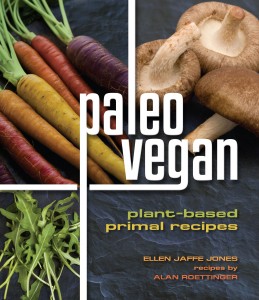After my post on “Ruby Red Jasmine” rice, I sent the folks at Alter Eco the link, so they could read what I said about their product. As I had figured, they were pleased. They responded by sending me samples of some of their other products, including a package of black quinoa. I’ve been busy lately, but I finally got around to trying it.
 If you’ve already made “regular” white quinoa and red quinoa, you know that the red takes longer and has a chewier texture than the white. Black quinoa takes even longer than red, and has a downright crunchy texture–although a pleasant one. I noticed that the instructions on the package hedge a little by indicating that we should “simmer until all water has evaporated.” A bit sneaky, but quite acceptable for a cook like me. I ended up adding a little liquid toward the end, in order to keep cooking it a while longer.
If you’ve already made “regular” white quinoa and red quinoa, you know that the red takes longer and has a chewier texture than the white. Black quinoa takes even longer than red, and has a downright crunchy texture–although a pleasant one. I noticed that the instructions on the package hedge a little by indicating that we should “simmer until all water has evaporated.” A bit sneaky, but quite acceptable for a cook like me. I ended up adding a little liquid toward the end, in order to keep cooking it a while longer.
I decided to make a sort of pilaff using chayotes–I don’t know if they have these in Bolivia, but I find most Latin American cuisines meld happily with one another. So I boiled two chayotes while the quinoa was cooking. When the chayotes were just tender, I peeled them and cut them into roughly half-inch dice.
I began the “pilaff” by sweating finely diced onion, celery, leekm and garlic in a couple tablespoons EVOO until very soft and fragrant. I turned up the heat and added the diced chayotes, stirring until almost dry and sizzling. Then I grated the zest of a large tangelo, set it aside, and squeezed the juice into the pot. As the juices bubbled, I added the cooked quinoa and turned the mixture until it was heated through. Then I fluffed in the tangelo zest and a bunch of chopped parsley.
The assertive crunchiness of the black quinoa made for a fun contrast against the tender-firm texture of the chayotes, and the rich aromatic background of slow-cooked vegetables, along with citrus and parsley notes, made this a very satisfying dish.







